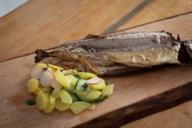
Whether in beer gardens, or at folk festivals both small and large: In Munich and the surrounding area, people celebrate life. This includes the intense smell of grilled fish. As not everyone owns a BBQ that fits for this dish, we can prepare the Steckerlfisch (grilled fish on a stick) in the oven! Munich’s chef Sven Christ shows how to make Munich specialities in a normal kitchen and with readily available ingredients. This time: Steckerlfisch with potato salad.
The marinade can be varied according to taste, as long as there is a tablespoon of salt in the liquid. I use laurel, fennel seed and juniper, and occasionally even some orange peel. Lemon juice or white wine vinegar (maximum two tablespoons) do no harm, thyme, rosemary and other herbs can also be used, but they are too Mediterranean for my personal taste.
You can’t go wrong with mustard seeds and coriander seeds either. Stir the marinade and let the mackerel marinate for a night in the fridge while covered. Then take them out of the marinade, dab dry and pull them onto the prepared sticks by inserting the stick through the mouth of the mackerel along the bone and almost to the base of the tail.
Rub the belly of the mackerel once more with some coarse salt; now clamp the mackerels in the holders located in the middle rack and roast them at 180 degrees with convection heat for 15 to 20 minutes. You should turn the mackerels once in between; that’s the reason why we use square rods.
Peel the potatoes and cut them into four millimetre thin slices, boil them in a pot with salted water for about twelve minutes until soft. Drain the potatoes and pour the warm vegetable stock over them while they are still hot. Add the mustard, vinegar and finely chopped onion and mix well, then leave to cool.
Cut the radishes and the cucumbers into fine slices and mix them into the salad, pluck the marjoram and add the leaves to the salad. Season to taste with a little salt and pepper, add the oil and leave to stand for another 20 minutes.
The Steckerlfisch pre-dates Bavarian beer garden culture and has always been offered at festive occasions – be it a church fair or a public festival. The reason for this is simple: The Steckerlfisch can be produced in large quantities, under the supervision of a single experienced grill master, and moreover most of the preparation is done the day before. This makes the Steckerlfisch a popular beer garden meal.
It needs plenty of fresh marjoram, because what rosemary, thyme and lavender are to the Mediterranean, marjoram, chives and parsley are to Bavaria.
Native white fish were the go-to ingredient in by-gone times, such as the now partially protected common Nase, which this year was even named fish of the year and used to be found in shoals in the Isar and the rivers around Munich. When this staple fish for the people of Munich had become almost impossible to catch, the city's residents had to look for other cheap fish and discovered mackerel, because sardines were considered too small for the Bavarians.
Noble fish such as trout, char and zander can also be found today on a stick, and I have even seen a Huchen (Danube Salmon) spanning one meter on a stick, but they are quite expensive as you can imagine. The mackerel has another advantage besides its price: It contains many healthy omega-3 fatty acids. A fatty fish that is healthy and tastes really good with beer when grilled – the city's residents will go to almost any length to get their hands on these delicious specimens.
I like to get my Steckerlfisch at the Augustiner-Keller (beer garden) or on the Auer Dult (festival), where my daughter enjoyed her first Steckerlfisch, and she liked it too, but I managed to get a bone stuck across my throat, which tormented me for ages. Today I know that you simply have to swallow one or two tablespoons of lemon juice or vinegar and wait a few minutes before then eating bread or pretzels until the fishbone becomes soft from the acid and slides down your throat with the chewed breadcrumbs.
The better choice of side dish to go with your Steckerlfisch, however, is potato salad, made the fresh Bavarian way, i.e. not with mayonnaise but with a broth and a sprinkling of radish. For the potatoes, I recommend the Moorsieglinde, a juicy and aromatic potato that doesn't turn to mush so quickly when used for a salad. It needs plenty of fresh marjoram, because what rosemary, thyme and lavender are to the Mediterranean, marjoram, chives and parsley are to Bavaria.
So much then for main event, but what if I get a craving for Steckerlfisch at home or when far away from Munich? Mackerel is available almost everywhere, thank goodness, and unlike the effort required to rustle up larger quantities, all you need is a normal oven to get a satisfactory result. The greatest skill here is to make sure the sticks fit exactly into the oven. It is important to put a tray under the mackerel to catch the fat, otherwise the next roast pork you do will have a definite whiff of fish about it.